10 Best AI Voice Agent Platforms for Businesses
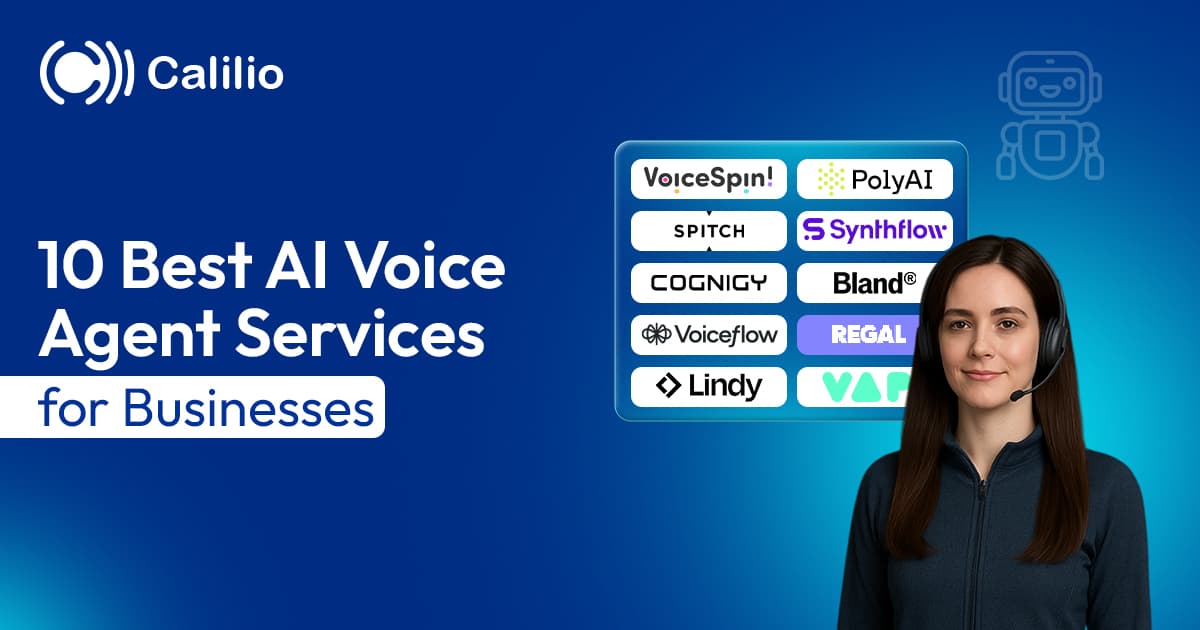
Managing high call volumes and meeting customer expectations is a constant challenge for businesses. Human agents alone cannot always provide 24/7 availability, instant responses, or handle thousands of interactions at once.
AI voice agents address this challenge by combining automation with advanced technologies like natural language processing and machine learning. They manage routine interactions, support customers in real time, and assist human agents with more complex cases.
To deploy these agents effectively, businesses need platforms that can host, train, and maintain them. That’s why many companies now seek reliable AI voice agent platforms capable of answering calls, handling requests, automating workflows, and operating 24/7 without additional staff.
In this blog, we’ll explore the top AI voice agent services for businesses, highlighting their key features, pros, cons, and pricing to help you choose the best platform for your needs.
Key Highlights:
AI voice agents automate calls using NLP and machine learning to handle high call volumes efficiently, reducing the need for manual intervention.
The top AI voice agent software in 2026 are VoiceSpin, Synthflow, PolyAI, Spitch, Cognigy, Bland AI, Voiceflow, Regal, Lindy, and Vapi.
When selecting an AI voice agent software, look for features like multilingual support, smart interruption handling, smooth human hand-offs to human agents, easy system integrations, and advanced analytics for performance tracking.
Choosing the right AI voice platform depends on your business size, technical expertise, and desired level of automation.
Understanding AI Voice Agents
An AI voice agent is an AI-powered system that engages users in spoken conversations using technologies such as Automatic Speech Recognition (ASR), Natural Language Processing (NLP), and text-to-speech (TTS).
These agents are also called AI voice bots, AI phone agents, or AI calling bots. They can listen, understand spoken language, interpret the caller’s intent, and respond with natural-sounding speech.
To use AI voice agents effectively in real business environments, you need platforms that allow you to build, run, and manage them. AI voice agent platforms provide the tools to create these agents, deploy them, and maintain their performance.
Features to Look for When Choosing an AI Voice Agent Service
When selecting an AI voice agent software, look for features that support smooth and effective interactions, like multilingual support, smart interruption handling, and seamless hand-offs to human agents. Also, ensure it integrates well with your existing systems and offers advanced analytics to help track and improve performance.
1. Multilingual Capabilities
A good AI voice agent should understand and respond in multiple languages and accents. This allows businesses to serve global customers and maintain consistent communication across regions.
2. Smart Interruption Handling
An AI agent service with smart interruption handling ensures the AI can pause, listen, and respond naturally when a caller interrupts mid-sentence. It keeps conversations human-like and prevents robotic or delayed responses.
3. Seamless Hand-Offs to Human Reps
Choose an AI voice agent software that enables you to transfer calls to live agents smoothly when an issue needs personal attention. Proper context hand-off helps human reps continue the conversation without losing information.
4. Integrations with Back-End Systems
The AI agent service should be able to access real-time information through Integration with CRMs, ticketing systems, and databases. This allows it to answer customer queries, update records, or trigger workflows automatically.
5. Customization and Fine-Tuning
Look for an AI voice agent platform with the ability to customize the AI’s tone, responses, and logic so that it aligns with your brand’s voice. Fine-tuning also improves accuracy and helps the AI adapt to specific industry needs.
6. Analytics and Training Tools
The platform should offer comprehensive analytics and training tools to let you track performance, identify weak areas, and retrain the AI with better data. These insights help continuously improve call quality and customer satisfaction.
Top 10 Best AI Voice Agent Platforms for Your Business
1. VoiceSpin
VoiceSpin’s VoIP-based contact center software platform offers an AI voice agent to handle both inbound and outbound calls, run automated workflows, schedule appointments, and qualify leads. This multilingual software can handle hundreds of calls at once and hand off conversations to human reps without losing any context. An AI voice agent isn’t a standalone solution that VoiceSpin offers, though. It offers a complete AI contact center software platform. You get access to international numbers in 160+ countries, advanced inbound/ outbound call management features, and telephony tools like an AI predictive dialer, AI-powered speech analytics, and call analytics.
An AI voice agent isn’t a standalone solution that VoiceSpin offers, though. It offers a complete AI contact center software platform. You get access to international numbers in 160+ countries, advanced inbound/ outbound call management features, and telephony tools like an AI predictive dialer, AI-powered speech analytics, and call analytics.
Key Features
- Support for 100+ languages
- RAG-based knowledge retrieval
- Smart interruption handling
- Contextual transition to human agents
- Integrations with third-party systems and APIs
- Advanced reporting and AI speech analytics
Pros and Cons
Pros | Cons |
| Offers an all-in-one AI contact center platform | Pricing is not publicly available; requires a custom quote |
| Highly scalable with multilingual support | It may be complex for small teams to set up |
| Powerful integrations with CRM, helpdesk, and productivity tools | Advanced analytics may require a technical setup |
| Automates both inbound and outbound workflows | Limited documentation for AI customization |
| Predictive dialer and real-time speech analytics enhance productivity | Cloud performance may vary by region |
2. Synthflow
Synthflow is a no-code AI voice agent platform that helps businesses build and manage AI phone agents quickly without any coding skills. It offers a simple interface that allows teams to automate calls, handle customer interactions, and respond in real time across multiple languages efficiently.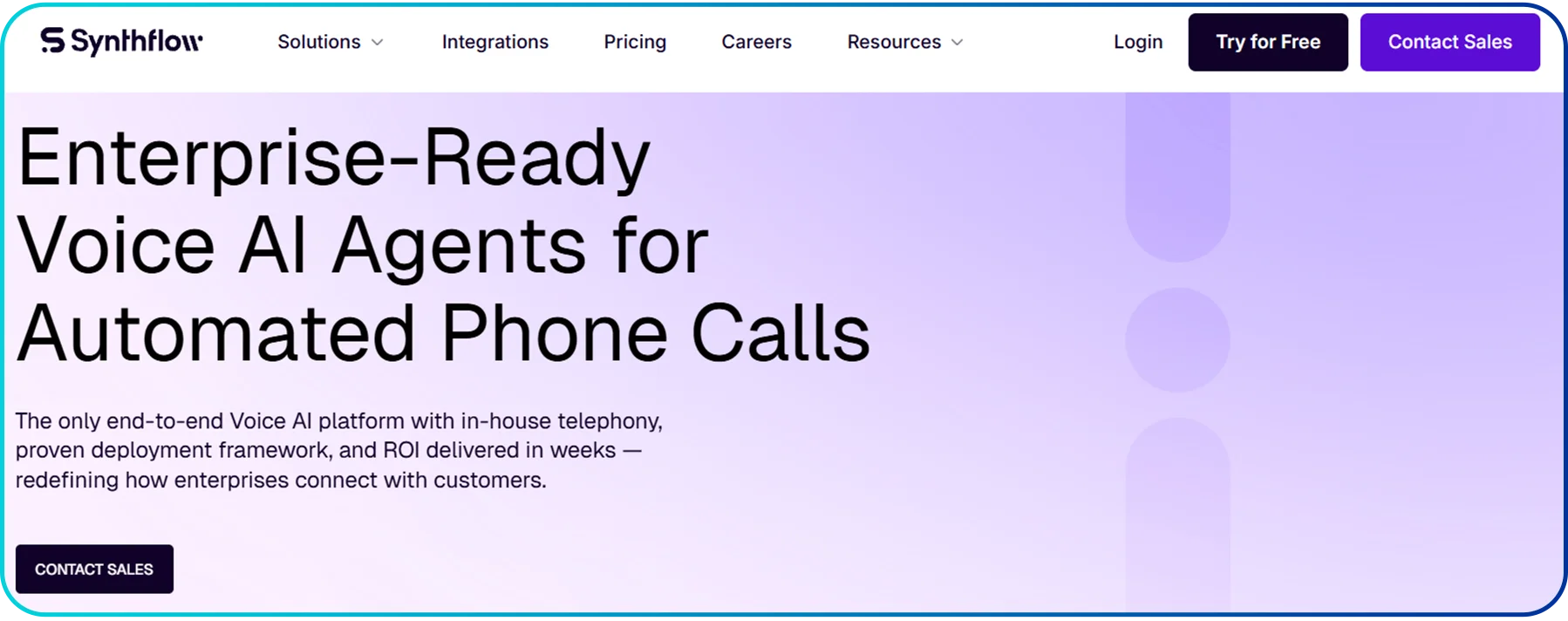 With Synthflow, you can design AI agents using a drag-and-drop interface, connect them to your CRM or third-party apps, and start handling outbound or inbound calls instantly. These agents can qualify leads, answer FAQs, schedule meetings, collect feedback, and even send follow-up messages through SMS or email.
With Synthflow, you can design AI agents using a drag-and-drop interface, connect them to your CRM or third-party apps, and start handling outbound or inbound calls instantly. These agents can qualify leads, answer FAQs, schedule meetings, collect feedback, and even send follow-up messages through SMS or email.
Key Features
- No-code AI agent builder for easy setup
- Real-time voice automation and natural conversation flow
- Multilingual support for global communication
- Integrations with CRM and third-party tools (HubSpot, Slack, Zapier)
- SMS and email follow-up automation
- Call analytics and performance reports
- Scalable, cloud-based infrastructure
Pros and Cons
Pros | Cons |
| Easy-to-use drag-and-drop builder | Limited advanced customization for complex enterprise workflows |
| Quick setup and deployment for SMBs | May not support deep AI learning or heavy logic branching |
| Affordable pricing with transparent plans | Some integrations might require manual setup |
| Handles both inbound and outbound automation | Not ideal for large organizations with strict compliance needs |
| Includes SMS, email, and CRM automation tools | Voice output quality depends on external TTS engines |
3. PolyAI
PolyAI is an advanced AI voice agent platform built to deliver natural, human-like conversations for customer service and support. It focuses on creating multilingual, context-aware voice assistants that can handle complex customer interactions across industries like banking, hospitality, retail, and travel.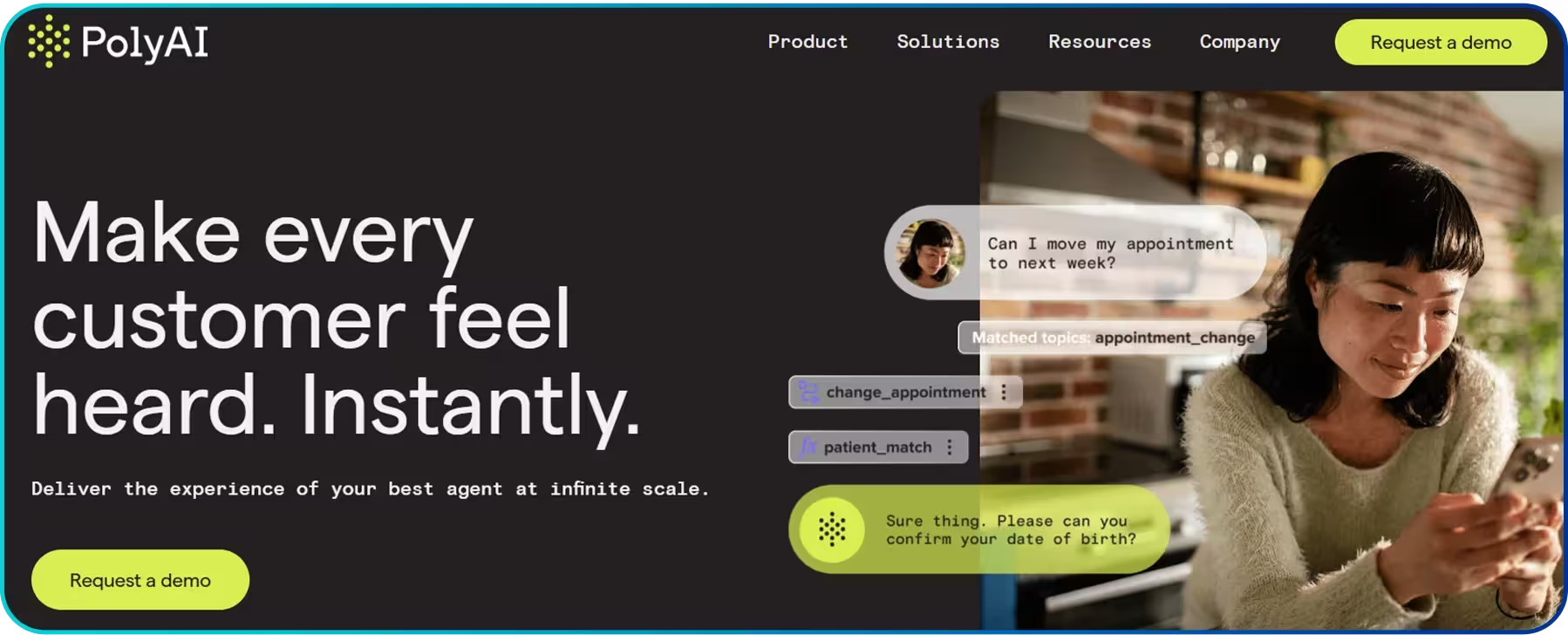 Unlike simple voice bots, PolyAI uses conversational AI, speech recognition, and Natural Language Understanding (NLU) to interpret tone, intent, and context in real time. Its voice agents can greet customers, verify identity, process payments, handle FAQs, and escalate issues to live agents when needed.
Unlike simple voice bots, PolyAI uses conversational AI, speech recognition, and Natural Language Understanding (NLU) to interpret tone, intent, and context in real time. Its voice agents can greet customers, verify identity, process payments, handle FAQs, and escalate issues to live agents when needed.
Key Features
- Multilingual and accent-tolerant AI voice agents
- Custom AI personas to match brand voice and tone
- Real-time analytics and performance insights
- NLU and Speech Recognition
- Seamless IVR and telephony integrations
- Contextual escalation to human agents
- Enterprise-grade security and compliance
Pros and Cons
Pros | Cons |
| Highly natural and human-like conversations | Custom pricing can be expensive for smaller teams |
| Supports multiple languages and accents | Requires training for optimal accuracy |
| Offers enterprise-level reliability and security | Not ideal for small businesses or startups |
| Customizable AI voice personas for brand consistency | A complex setup may need technical assistance |
| Integrates with IVR and backend systems smoothly | Limited DIY customization compared to no-code tools |
4. Spitch
Spitch is a Swiss-based AI voice platform that specializes in speech analytics, voice biometrics, and virtual assistants. It focuses on helping enterprises automate conversations securely while maintaining compliance with strict regulations. Unlike many generic AI voice agents, Spitch is built around speech-to-text, NLP, and emotion recognition, giving it a deeper understanding of human speech and tone. Its voice agents can verify identity, handle customer inquiries, route calls, and support agents during live interactions through real-time transcription and insights.
Unlike many generic AI voice agents, Spitch is built around speech-to-text, NLP, and emotion recognition, giving it a deeper understanding of human speech and tone. Its voice agents can verify identity, handle customer inquiries, route calls, and support agents during live interactions through real-time transcription and insights.
Key Features
- Emotion and intent recognition for deeper understanding
- Visual conversation flow builder for easy customization
- On-premises, cloud, or hybrid deployment options
- Voice biometrics for secure identity verification
- Omnichannel support across voice, chat, and mobile
- Seamless CRM and contact center integration
- GDPR-compliant data handling and reporting
Pros and Cons
Pros | Cons |
| Strong emotion detection for more empathetic responses | Interface may feel technical for non-developers |
| Highly flexible deployment and integration options | Voice tuning requires expert configuration |
| Excellent for industries with strict data regulations | Limited pre-built templates for quick setup |
| Scalable for complex enterprise contact centers | Pricing varies depending on the customization level |
5. Cognigy
Cognigy is a powerful conversational automation platform designed to help enterprises build advanced voice and chat experiences with minimal effort. It focuses on hyper-personalized customer engagement, connecting voice bots with backend systems like CRMs, ERPs, or ticketing tools to provide context-aware, action-driven conversations. This makes every interaction faster, more efficient, and more human-like.
Cognigy’s AI agents can manage both inbound and outbound calls, detect intent and emotion, and seamlessly hand off conversations to live agents when human assistance is needed. The platform also includes real-time analytics, conversation orchestration, and continuous learning capabilities that help businesses refine performance over time.
Key Features
- Low-code platform with a visual conversation builder
- Integration with CRMs, ticketing, and ERP systems
- Real-time conversation orchestration and analytics
- AI-powered intent and emotion detection
- Multimodal experience across voice, chat, and messaging
- Seamless agent handover with full context retention
- Strong security and call center compliance for enterprise use
Pros and Cons
Pros | Cons |
| Low-code design allows quick setup without deep coding | Steeper learning curve for advanced automation |
| Deep backend integrations enable personalized interactions | Pricing may be high for small businesses |
| Works across multiple channels, voice, chat, and messaging | Requires ongoing tuning for best performance |
| Excellent analytics and performance tracking | The interface may feel complex to new users |
| Reliable and scalable for large enterprises | Some integrations need developer configuration |
6. Bland AI
Bland AI is an AI-powered calling platform that allows businesses to make thousands of outbound calls with natural, human-like voices. It focuses on high-volume voice automation for sales, surveys, and customer engagement. The platform enables users to design and deploy AI agents that can book appointments, qualify leads, collect feedback, or deliver updates, all without human intervention. What makes Bland AI stand out is its simplicity and speed. Users can connect it to CRMs or spreadsheets and launch calling campaigns within minutes. Moreover, its AI agents adapt to real-time customer responses, maintain context during conversations, and support custom scripts for better personalization.
What makes Bland AI stand out is its simplicity and speed. Users can connect it to CRMs or spreadsheets and launch calling campaigns within minutes. Moreover, its AI agents adapt to real-time customer responses, maintain context during conversations, and support custom scripts for better personalization.
Key Features
- High-volume outbound AI calling
- Customizable voice scripts and workflows
- Real-time data syncing with CRMs and spreadsheets
- Call analytics with performance tracking
- Instant campaign setup with API support
- Scalable for startups and enterprises alike
Pros and Cons
Pros | Cons |
| Easy to set up and scale | Limited inbound call capabilities |
| Affordable pricing for bulk calling | Lacks deep integrations with third-party tools |
| Custom scripting allows personalized calls | Basic reporting features compared to enterprise tools |
| Great for lead generation and surveys | It may sound robotic in complex conversations |
7. Voiceflow
Voiceflow is a conversational design and prototyping platform built for teams to create, test, and launch AI-driven voice and chat experiences. It bridges the gap between designers, developers, and business teams by offering a collaborative workspace where anyone can design dynamic conversation flows visually.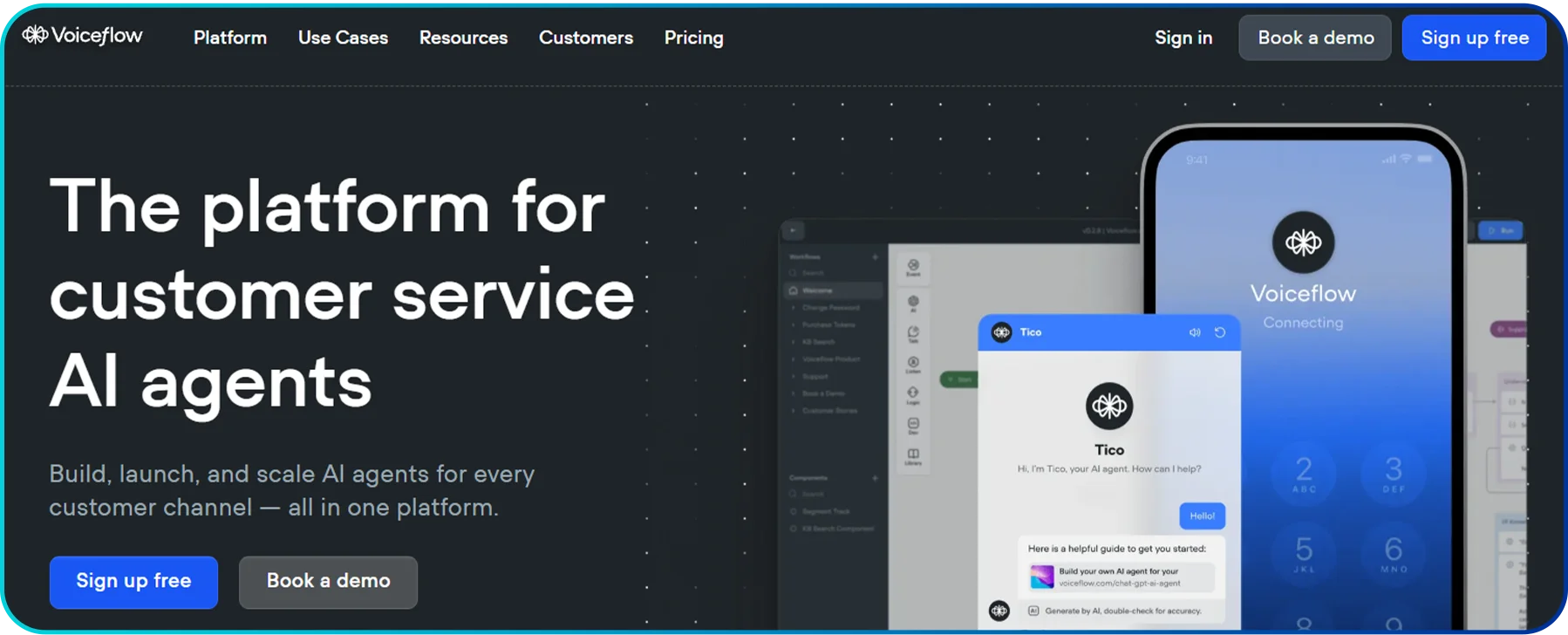 Voiceflow supports both simple bots and complex, context-aware assistants. Its modular design allows you to create reusable components, import large datasets, and connect APIs for real-time responses. Many enterprises use Voiceflow to accelerate conversational AI projects without writing heavy code.
Voiceflow supports both simple bots and complex, context-aware assistants. Its modular design allows you to create reusable components, import large datasets, and connect APIs for real-time responses. Many enterprises use Voiceflow to accelerate conversational AI projects without writing heavy code.
Key Features
- Visual conversation design workspace
- Reusable components for faster project scaling
- Collaboration tools for design and engineering teams
- API and database integration for real-time responses
- Testing and simulation tools within the platform
- Cross-channel deployment (voice and chat)
Pros and Cons
Pros | Cons |
| Excellent for rapid prototyping and collaboration | Lacks built-in telephony or calling support |
| Easy-to-use visual interface | Requires separate tools for production deployment |
| Supports API and database connections | Limited analytics compared to contact center platforms |
| Great for designing complex conversational flows | More suited for design than direct operations |
8. Regal
Regal is a revenue-driven AI voice and SMS platform that helps sales and marketing teams automate outbound engagement while maintaining a personal touch. It focuses on driving conversions through humanized AI cold calls and text conversations that feel authentic.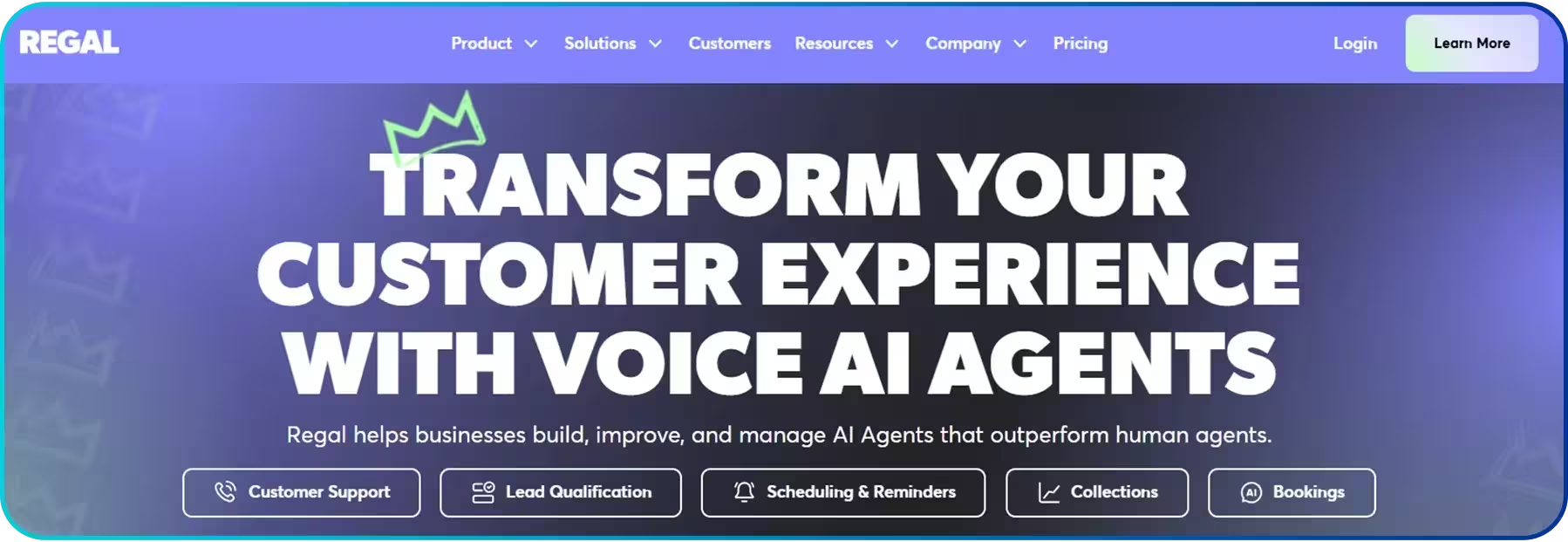 The platform’s key strength lies in its data-based personalization. Regal connects to CRMs and marketing automation tools, using real-time behavioral data to trigger outreach at the right moment. This makes it highly effective for customer retention, product renewals, and follow-ups.
The platform’s key strength lies in its data-based personalization. Regal connects to CRMs and marketing automation tools, using real-time behavioral data to trigger outreach at the right moment. This makes it highly effective for customer retention, product renewals, and follow-ups.
Key Features
- No-code AI voice agent builder
- Support for 30+ languages
- Customizable voice and agent personality
- A/B testing capabilities
- Seamless escalation to human reps
- 40+ native integrations with third-party tools
Pros and Cons
Pros | Cons |
| Strong focus on sales and retention automation | Limited use for inbound support operations |
| Highly personalized, data-driven outreach | Customization may require developer setup |
| Seamless CRM and workflow integration | Pricing varies by campaign scale |
| Great for improving engagement and conversions | AI voice options are limited compared to other competitors |
9. Lindy
Lindy is an AI assistant platform designed to help businesses and professionals automate repetitive communication tasks through voice and natural conversation. It goes beyond customer service; Lindy acts like a digital team member that can handle scheduling, data entry, onboarding, and follow-up communication.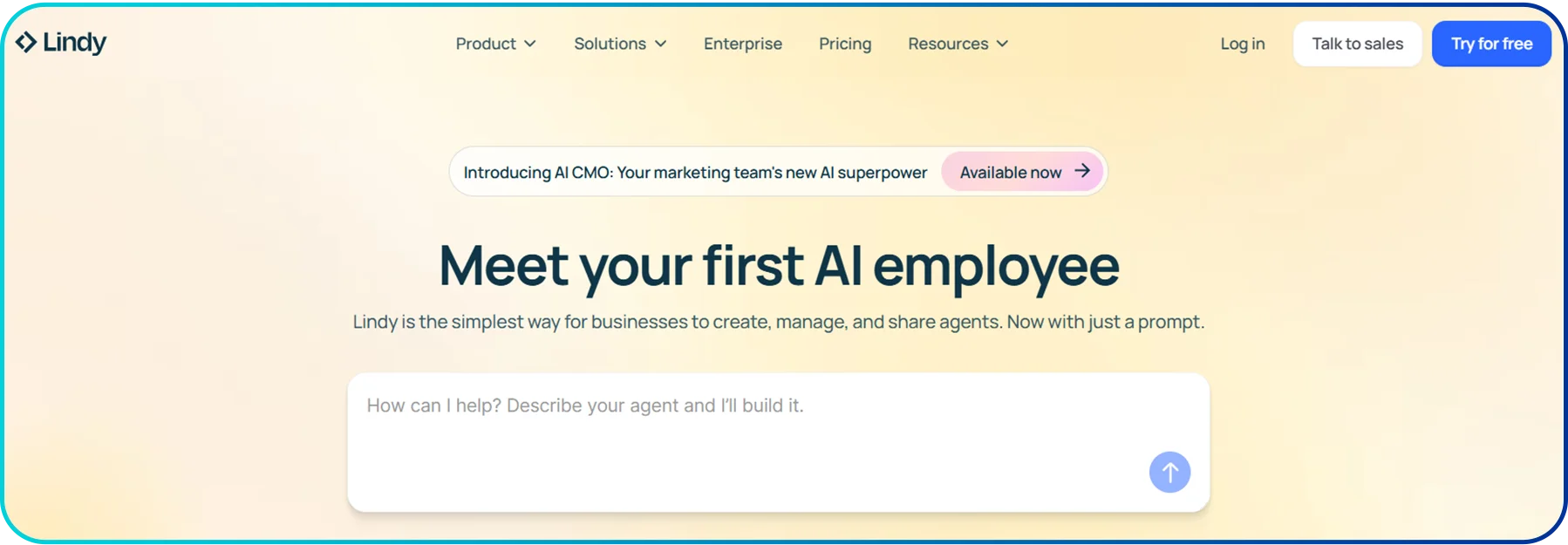 The platform allows users to train their AI assistant using company documents, FAQs, and CRM data to ensure accurate, on-brand responses. It integrates easily with popular workplace tools, making it ideal for internal automation as well as customer-facing use cases.
The platform allows users to train their AI assistant using company documents, FAQs, and CRM data to ensure accurate, on-brand responses. It integrates easily with popular workplace tools, making it ideal for internal automation as well as customer-facing use cases.
Key Features
- AI assistants trained with custom company data
- Workflow automation for scheduling and CRM tasks
- Voice and chat-based communication handling
- Integration with email, calendar, and CRM systems
- Knowledge-based response customization
- Secure cloud architecture for enterprise use
Pros and Cons
Pros | Cons |
| Automates both internal and external communication | Limited advanced telephony functions |
| Highly adaptable and customizable | Initial setup can take time for data training |
| Works well with business productivity tools | May lack advanced analytics |
| Great for reducing administrative workload | Not focused on call center operations |
10. Vapi
Vapi is built to create intelligent, real-time conversational agents for phone and web applications. It focuses on giving businesses full control over voice interactions, from inbound and outbound calls to automated workflows, by using powerful speech and language models.

Unlike typical AI assistants, Vapi is designed for customization and scalability. It integrates with different APIs, CRMs, and business systems to enable tasks like appointment scheduling, lead qualification, or call routing. It also supports natural, low-latency conversations through integrated Speech-to-Text (STT), Large Language Model (LLM), and Text-to-Speech (TTS) technologies.
Key Features
- Full developer control
- Real-time low latency
- Voice-to-action integration
- Multi-agent collaboration
- Scalable cloud infrastructure
Pros and Cons
Pros | Cons |
| Highly customizable and advanced use cases | Requires technical expertise to set up and manage |
| Near real-time voice response with ultra-low latency | Not beginner-friendly for non-technical teams |
| Works with multiple AI and voice model providers | Pricing can become complex due to usage-based costs |
| Strong telephony integration for inbound/outbound calls | Focused mainly on voice with limited support for text or chat automation |
| Easily integrates with external APIs and CRMs | Limited pre-built templates for customer interactions |
Here’s a quick comparison between the best AI Voice Agent services for businesses:
Provider | Pricing | Key Features | Best For |
| VoiceSpin | Custom pricing | AI auto aialer, Predictive dialing, Voice analytics, CRM integration | Sales and support teams needing scalable AI-powered call automation |
| Synthflow | $29/month | No-code AI builder, Real-time call automation, CRM integration, Multilingual, SMS support | SMBs and agencies looking for fast AI voice deployment without coding |
| PolyAI | Custom pricing | Multilingual AI agents, Real-time analytics, Seamless IVR integrations | Large enterprises needing human-like multilingual voice automation |
| Spitch | Custom pricing | Voice biometrics, Speech analytics, Virtual assistants, Agent assist | Enterprises and government agencies focused on security and compliance |
| Cognigy | Custom pricing | Generative AI, Multichannel voice gateway | Large organizations needing scalable enterprise-grade AI communication |
| Bland AI | Custom pricing | Programmable AI agents, Voice cloning, Real-time API data, Slack/CRM integration | Developers and businesses automating calls using programmable APIs |
| Voiceflow | Free plan; Paid from $40/month | No-code conversation design, Multi-channel AI agent builder, Team collaboration, API integrations | Product and CX teams designing complex AI-driven conversations |
| Regal | Custom pricing | AI agent for sales outreach, Predictive calling, Workflow automation, and CRM syncing | Revenue teams focusing on AI-assisted sales engagement and follow-ups |
| Lindy | Free plan; Paid from $49/month | Custom AI agents, AI voice assistant, 3,000+ app integrations | Teams seeking flexible task automation with AI voice and workflow tools |
| Vapi | Custom pricing | Real-time AI voice agents, OpenAI & ElevenLabs integration, Live call API, Multilingual support | Developers and startups building AI voice applications via API |
Conclusion
AI voice agents are transforming the way businesses communicate by automating calls, improving response times, and reducing the workload on human agents. They make it easier to manage large call volumes, deliver personalized customer experiences, and maintain 24/7 availability, all while lowering operational costs.
However, every AI voice agent platform offers different strengths. Some focus on simplicity, while others offer advanced customization. Choosing the right one depends on your business size, technical needs, and how deeply you want to integrate AI into your communication system.
Summarize this blog with:
Frequently Asked Questions
What does an AI agent do?
An AI agent automates tasks like answering calls, booking appointments, or routing queries through natural, human-like conversation.
Can AI voice agents replace call center staff?

Still have questions?
Can’t find the answer you’re looking for? Please chat with our friendly team.
Stay in the loop
Get the latest call insights, trends, and updates delivered straight to your inbox.
By subscribing, you agree to receive updates from Calilio.
You can unsubscribe anytime.
